Randy Holden interview
Randy Holden is most well known for his involvement with bands like Fender IV, the Sons of Adam, the Other Half, Blue Cheer and one and only project called ‘Population II‘.
Randy Holden was born in Pennsylvania and grew up on the move. He played in a number of bands including the Iridescents (blues rock), the Fender IV (surf rock) and the Sons of Adam (surf rock/psychedelic rock). Holden relocated the Fender IV from Baltimore, Maryland, to Southern California and they eventually became The Sons of Adam. While playing in the Sons of Adam Holden opened for the Rolling Stones at their first show at the Long Beach Sports Arena. Read the full story below.
“I was envisioning a volume level so far over the top, it would create silence, and within the silence would reside beautiful music never heard before”
How are you these days? I would like to start at the beginning. You were born in Pennsylvania. Your first band was called The Iridescents. Did you ever record anything?
Yes, although it was so long ago, there isn’t any surviving copy as far as I know. I didn’t think it represented the band as I recall. It was a quarter inch tape studio, a couple of acetates were made, but they wear out after a couple of plays.
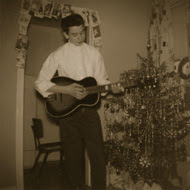
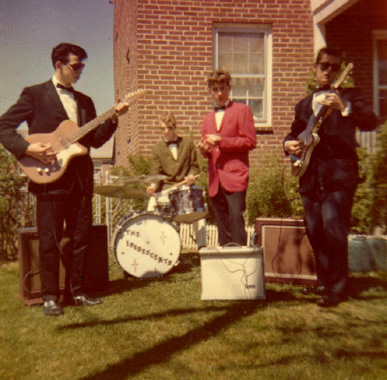
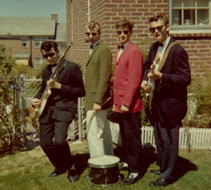
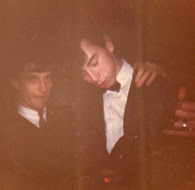
I heard you had great energy while playing shows?
You mean getting all wound up haha … tends to happen.
You formed the Fender IV in 1964. You released two singles. Were you influenced by Dick Dale and other surf artists?
Yes. We released two promotional singles. I came across Dick Dale when his band did a guest appearance at a gig we had. I don’t recall where the gig was. What stuck in memory was his band packed up my Fender Dual Showman amp in their tour bus, about to leave town with it. That would have been a disaster for me. I noticed my amp was gone, and Dick Dale was the only guitarist besides myself at that time who had that big amp, so I went outside to see if his guys were mistakenly loading in their tour bus, and sure enough there it was. No doubt they assumed it was theirs since the amp was new from Fender at that time, and I had the only one on the east coast at that time, but they had no way of knowing that. Dick was a great player, with a lot of energy, and a far different sound for that era, especially on the east coast. I was into instrumentals with a big sound in those days. The audience wasn’t quite sure what I was doing, since all the bands in Baltimore did nothing but Ray Charles, James Brown and R&B. They were starting to relate to instrumentals though. Duane Eddy did a couple of big live performance shows and was top bill over guys like Bo Diddley, and the Coasters, who were doing something besides Ray Charles, and James Brown. When Dick Dale came on at the gig we were doing, it was really interesting. I really dug what he was doing, but then I understood it, but the audience was completely clueless. Dick Dale had such a special gig going for himself, he should have never gone on tour. His dad I guess leased an old wood ballroom, and it was a great venue, and it was exclusively Dick Dale, and he always filled the house with surfer kids. The rest of the country had no Surf, so they couldn’t participate in the specialized identity at that time. Then Capitol Records, I recall that was the label that had Dick Dale, decided to change the concept from Surf Music, to Hot Rod Music, in the effort to identify what every American kid could identify with, but the concept bombed. In California where Dick had his audience, the Hotrod Music image was thought of as Greasers, and was not what Surfers identified with at all, and he lost his audience at home. Corp nonsense to make bucks. I always felt if he’d never gone on tour, but kept doing his ballroom gig, he would have continued to gain an audience, even in spite of the British Rock invasion. In so far as my own inspiration regarding Surf Music … that was the question wasn’t it … I go off rambling and forget ha ha … Anyway, I was standing at the bus stop for school one morning in September, and it was 4 below zero, ice everywhere. I was freezing, literally. I had a small transistor radio, a High Tech in those days. The Beach Boys were getting airplay in Baltimore with ‘Surfin’ Safari,’ and listening to that while frozen solid in ice … I just said enough is enough. I hated the cold, and the lyrics in the Beach Boys style of Surf Music painted these images in my mind that made more sense than anything I was doing where I was, and what I was doing. So off I went to California, where I could unthaw, and do what I had to do.
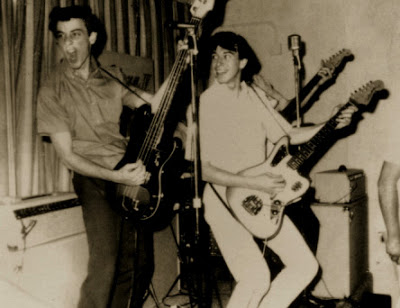
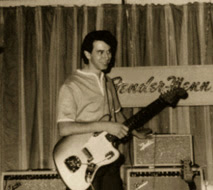
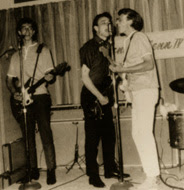
What was the scene on the west coast?
The scene when we arrived was called starvation, not California, but us, literally. It was a rough go for a few months, then we began to tune it in. We got a gig, no drummer, but picked up one on the fly, and once we played, that changed everything. We became an instant demand. A lot going on then all at the same time. We arrived in California the day after Kennedy was assassinated.
Then you formed the Sons of Adam.
I formed the Sons of Adam, and we just changed the name to Sons of Adam, it was Kim Fowley’s idea, and we liked it, and had depth to it. I didn’t know anything about recording, except you go in a studio and play. Most of the time it never sounded right to me afterwards, but I didn’t know why. The huge speakers they used in studios in those days were so powerful they generated excitement on playbacks, so it all sounded good in the studio, but when the acetate was played it was a whole other story. The best session we ever had was at RCA Studio B with Dave Hassenger as the engineer, and he did the Rolling Stones engineering, and knew what he was doing, knew how to handle big sound. Gary Usher was the producer, and Gary seemed to have a pretty good grip too, except he kept trying to make us sing like the Byrds, but that was not where we were coming from at all. We didn’t have beautiful three part harmony type voices, so it was like competing against ourselves. We were raucous in the vocal realm. We could pull off the harmony thing, and it would work, we did a lot of Beatle covers in the previous couple of years, you couldn’t not, not do Beatles songs. We did a pretty damn good job of doing other bands’ music, more often than not better than the bands themselves in live performances, and better than any band in California. We were very strong in live performances. No one could follow us, but then that was the goal. It was a “yes, we love our fellow brother musicians,” but it was still, go on stage and kick their ass, and if you didn’t, it would be a shame on you, go get a real job.
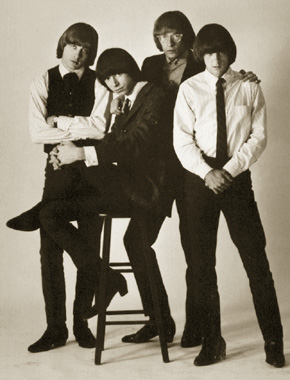
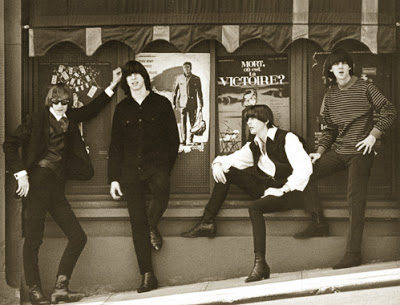
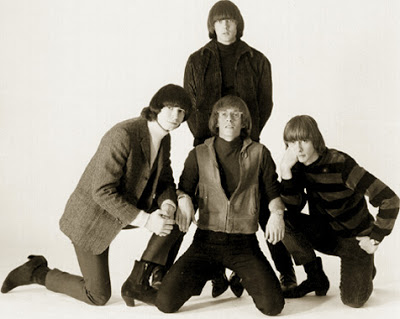
(L.A., California – 1966). Photo courtesy Jac Ttanna (Joe Kooken)
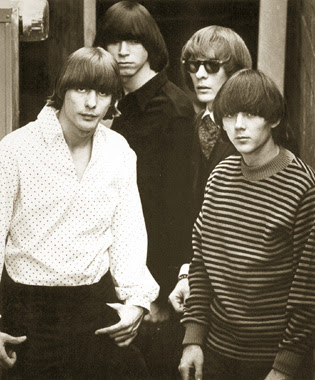
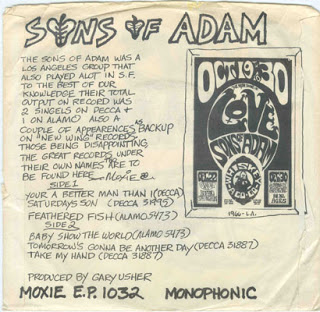
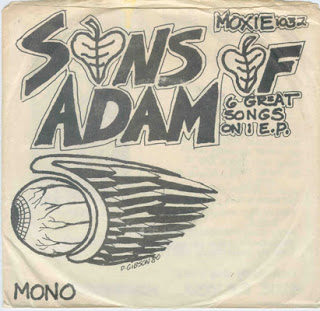
The Other Half followed and you weren’t very satisfied with the result of the album you released.
The recording was the worst ever, for a multitude of reasons. I personally was having a real issue getting a sound out of the ax I had at that time, a Fender Jazzmaster. It had zero sustain, and while it could work for Surf Music, it sucked for anything else. I only decided to get one because I had some illusion it had a longer neck and I have large hands, I thought it would be easier to play (and I use to drool over its design when it first came out and I’d read the two page Fender catalog over and over while having morning cereal … I’d brainwashed myself early on to love them, and that was the subliminal influence that made me go for it. What a bloody mistake (should be a lesson not to let your kids read anything at breakfast, it will make them do goofy things). In short I just hated that guitar. I couldn’t get a sound out of it, and I didn’t have any concept at the time that the reason was because it had no sustain plate, all it did was thump, or have uncontrollable feedback instead of sustain. Problem was I had no money to get another guitar, so I was stuck with it, until I didn’t know when. The first great guitar I had was a Stratocaster. It did whatever I wanted. I moved to the new Fender Jaguar when it first came out, because the music store I dealt with got a purple one with gold plating that flipped my cork. It was gorgeous for the time. In California I had it refinished into a silver to purple metal flake burst. That was the most beautiful finish I’d ever seen on a guitar. Very different, but just pretty as hell. Its sound was great for Surf Music, and the early English band things, but for blues it sucked. I pretty well wore it out. We played every night of the week, five hour a night, for years, and that took its toll. I eventually decided to take it apart and build a new hollow body version. I thought I might get sustain our of it with a hollow body, but it was a total experiment. I did it, and it was pretty interesting. No one had anything like it. A hollow body Fender Jaguar ha ha … What a trip. Although it didn’t sound good at all for what I was doing, and that was a disappointment. I did take it to the Fender R&D guys who I knew most of them, thinking maybe they’ll like the idea, and I might be able to get a new ax if they do. Then there was some new guy in charge of the dept. Everyone loved it, but the bossman was brought in to check it out, and he knocked with his knuckles on the body real hard, and kept saying hello hello hello into the sound hole, where the S hole was in the old Gibson hollow body Jazz guitars, except I designed more of a slash for the sound hole. Looked better. But the supervisor guy just said, no sound back, can’t hear anything, it’s not worth anything to Fender. He was a bit rude, and had the kind of attitude you wouldn’t care for. Then a year or two later Fender started manufacturing Telecasters in hollow body just like the design I brought them. I thought gee whiz, you guys took the idea and didn’t even give me a guitar, when I seriously needed an ax. Fender was on its way down in those days, and sold out to CBS and wrecked the company. Took some years to recover from that mess. Corp always wrecks anything they touch, when money only interest consumes its goal. Oh man I’ve gotten so far off track I forgot the question – one thing always leads to another, my brain is like watching a movie from the inside out … So, no I hated the sound of the Other Half album, but I think I hated it a lot more than I would have when it came back from mastering, finding someone dubbed in all these weird phony laughs, and weird audience reaction, and some goofy bubble poppy piano … that made the whole thing a disaster in my mind. It’s kind of like one sin destroys the entire cloth. I’ve never liked it from that day to now. I felt embarrassed by it, because the fake garbage was not the band. I don’t know where that came from. That killed any chance that band ever had to do anything significant. I didn’t do my best by any measure. I’m very right brain oriented. Many things about it just depressed me severely. It didn’t reach my expectations. But that’s me. It seems quite a few people liked it in the aftermath.
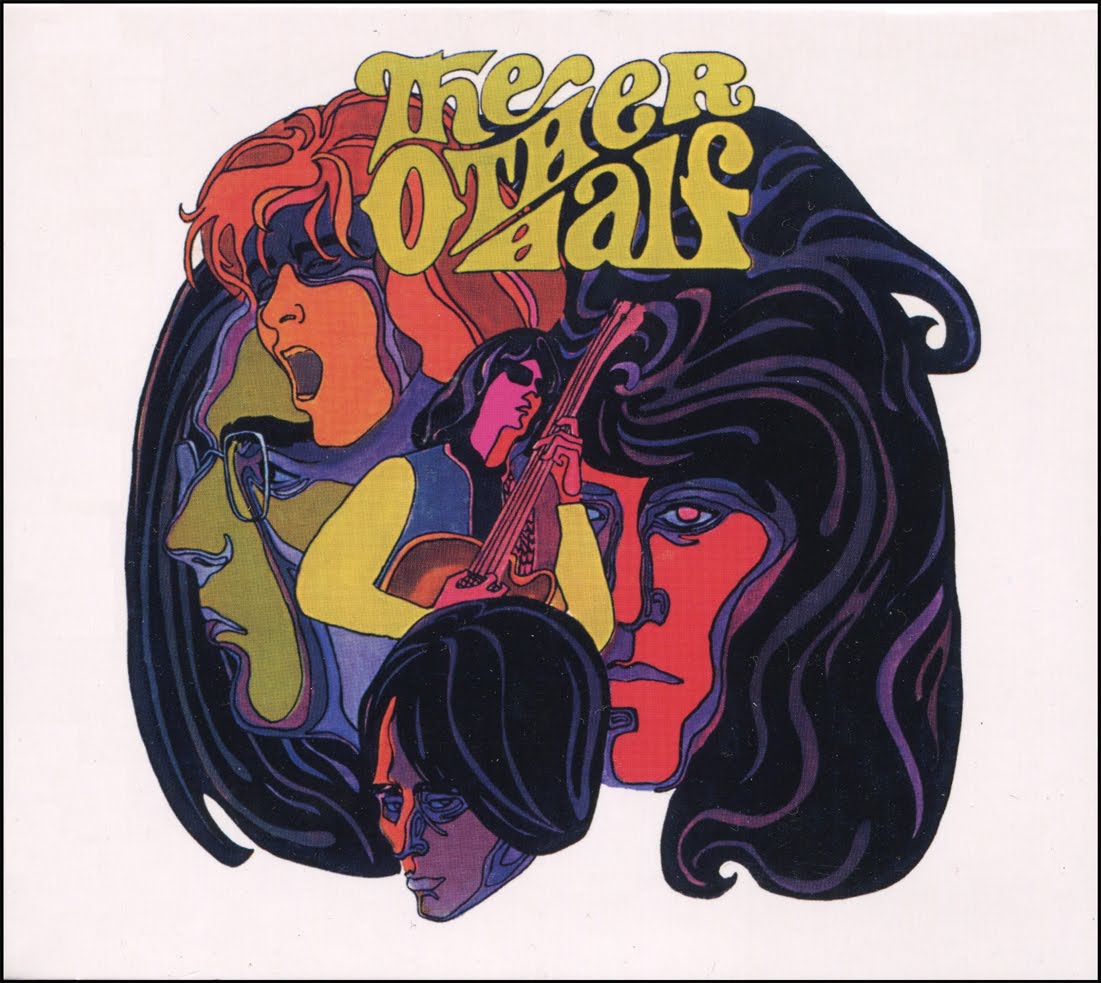
Who did the cover artwork?
I have no clue. I was so disgruntled with the sound of my guitar I stopped caring about the album at all. I wasn’t involved in mixing, mastering, artwork, anything. I didn’t want to be. It was a big disappointment to me. It was a pretty good stage band though. We left some marks on our minds doing live shows, but nothing ever seemed to quite come together. I lost my sense of identity with what we were doing.
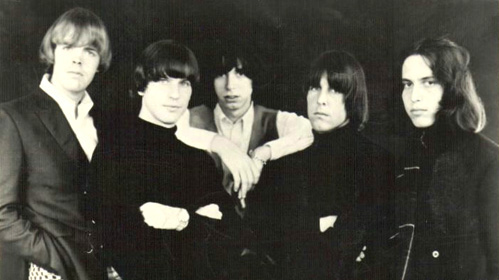
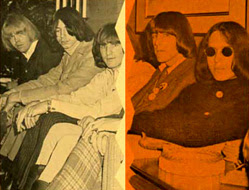
“I play music because I dream it”
Then you joined Blue Cheer.
I’m sure there are quite a few interesting stories I can tell, but I doubt they’re suitable for publication, or at least sex drugs and rock & roll stories have been told more times than enough, so I’ll refrain from being too graphic, but I can say I really wasn’t into drugs much at all. Mostly because I didn’t like most of what they did. I tried things, but I saw no purpose. They disrupted my ability to create. I remember the first time I was given cocaine by the manager who said, hey try some of this, and make some music … I couldn’t have played if I tried. I just kind of went into some stupid spin, with a smile on my face, thinking absolutely nothing. It made me brain dead. Playing music was as about as far from my thoughts as it could get. Zero inspiration whatsoever. I have no idea why, but I could see where someone could get attached to a certain chemical taste it leaves, but your mental state has to be willing to want that nothing about it to be willing to do it, which means you give up a whole other horrendous things you’ve always thought were valuable in life, and take on a whole new lifestyle that’s immersed in some kind of deep city way of life that I was never attracted to, no matter that some people love it. That probably depends if you were brought up able to leave it if you wanted, or afraid to leave it. I’ve known a lot of people who were afraid to leave the deep city, terrified as hell to leave it. They had no way to relate to anything outside of what they knew. Maybe that’s why I was never attracted to drugs. I think I also figured that if the people around me were willing to put music in second place and a heavy drug in first place, then damn it must be really good, but I didn’t want to know anything that good, when I saw what it did to their life’s interests. There were drugs all over no matter where we went, and a substantial part of the audience wanted to party with drugs with us. I remember some kind somewhere in the Midwest who found where we were staying and came over wanting us to take some acid with them. Jesus Christ you gotta be kidding me. I think the drug thing was so romanticized they thought it was normal fun. I had no way to relate to that. If you have schedules, and commitments, and all that, there is no way you can do it if you’re blanked out. I suppose if you’re bored, and there’s nothing exciting in your life, that might have a great appeal. So from that perspective, stepping into a lot of other people’s shoes to see what their personal lives are like, there’s a lot of people who have no dreams. But I also think when you replace the ability to dream, through drugs, you can also lose a lot of possible real dreams that you could pursue, but you won’t if drugs become a priority substitute for the lack of dreams. I play music because I dream it, but what I do is give others dreams they don’t have a way to feel without people who do what I do, no matter what form of entertainment it is. A lot of people don’t know how to entertain themselves in any meaningful way. It’s also very scary to do that, because when you decide to follow your dreams they can just as easily lead to nightmares, and that just comes with the territory. A lot of people don’t survive following their dreams. Music gives people something to feel good about, but when drugs become more important than music, then you lose both the dreams and the music. Sex is a whole other matter of the power of nature. I’m not sure how one avoids beautiful ladies’ desires to be with you. I can’t say I’ve ever had such a strong moral stature that I didn’t enjoy their company. Quite the opposite. I love women, what amazing creatures. They are totally enthralling in every way imaginable, and unimaginable. I’ve learned so much from women I’d be pretty short of being full without what I’ve learned from them. They are ex so I’ll sit this one out for the time being.
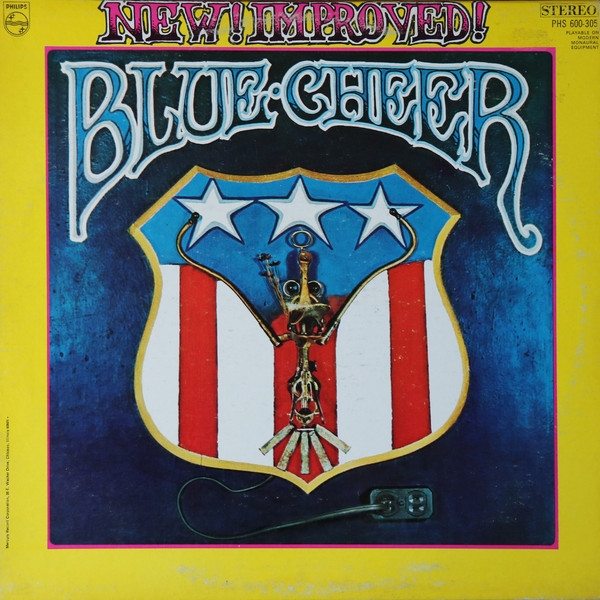
What happened after Blue Cheer?
I went directly to pursue my vision of the sound I was trying to reach. I thought with Blue Cheer I could pursue what I dreamed, but unfortunately management was directly opposed to me, much to my surprise, and that opposition only grew over time. The first question I asked was, could I have twice the amps you guys are using, and management said No! Wow, really, why not? We don’t have the money. Questioning the money was forbidden. Hostility always ensued from the management. The reasons became clear over time. I had to go a different direction if I was going to follow the dreams of sound I had as a constant. I once tried to imagine what a nuclear blast would sound like in close proximity, and imagine my surprise when my imagination concluded perfect silence … I was envisioning a volume level so far over the top, it would create silence, and within the silence would reside beautiful music never heard before. No doubt that sounds a bit whacked over the top itself, unless and until you imagine it.

What are some of the strongest memories from recording ‘Population II’?
What stands out at a thought, I kept hearing a distortion somewhere in the board in the playback, and I never heard it in the studio. I’m pretty keen with sound, I could tell instantly when a speaker or an amp head blew in the setup of the 16 x 200 watt amps. I knew I was hearing a faint distortion in the board, but the engineer swore he couldn’t hear anything. That was maddening, because it was solidly present. It made the entire thing sound like garbage. After a week of fighting with the engineer about it, he finally said he heard it, and he stripped the board down, and repaired it. That was a three day downtime, but he did repair it, it was gone. When in the studio, it’s a place of Study. That environment is different from playing at home, or playing on the stage. It used to be difficult for me to work in a studio, because for the most part I knew very little about the mechanical function of a studio. All I knew about was the sound I wanted to get, and that’s always been the most difficult thing to do. You can spend all day working to get a sound. These days that seems to come pretty easy for the most part. If it doesn’t I just stop and walk away, and come back when I’ve no expectations, other than knowing what I want to hear. A great sound makes your skin get goosebumps. A horrid sound makes your teeth grind. The rest is to close your eyes and turn the dials and see if that’s what you are looking for. More often than not, in fact most often, I do everything you’re not suppose to do, and the engineer is telling me there is no frequency change in the range I’m working in, but I stop and say Listen … then do it again with out whatever the setting was, and say tell me you can’t hear the difference, and he says, yea I hear a difference, but there isn’t suppose to be any difference. Right, so what are you going to believe, what the book says, or your ears.
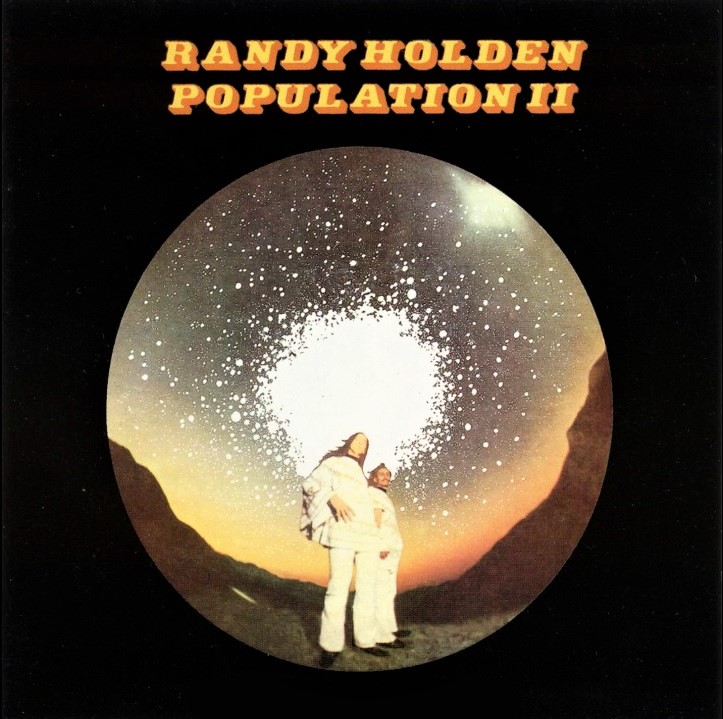
Where did you and Chris Lockheed (drummer for ‘Population II’) met?
That’s a question that’s been around the block a few times. Knock, Knock, Knock … who’s there. You don’t know me, my name’s Chris, I heard you need a drummer. I opened the door, and there was Chris. He said, “I saw you with Blue Cheer at your last gig up in Stockton, that’s where I’m from, and I hear you left the band, and were looking for a drummer”. Me, “So, can you play at high volume. Or better, do you like playing at high volume”!.. Chris says, “Well sure, and I can play keyboards too”! Me, “Really, can you play drums and keyboard at the same time” … Chris, “… uuhhh yea, I can do that, sounds different, but why not”. Me, “You Can ? … Chris “sure why not”. Me, “Cool, Ok lets do it”! So we did it!
“Sound is an illusion”
You had sixteen 200 Watt Sunn amplifiers. How was handling with so much power?
It was the amp power I always wanted. I knew exactly what I wanted to do with it, and it was an over the top blast … I used to wonder what it would be like to line the LAX International airport runway with a few thousand amps, and see who came out best, the jets taking off and landing, or my guitar, haha … yea I suppose I must be a little nuts, but only because I never found a way to do it, I mean, what if I blew a jet off the runway with all those speakers creating a blast of sidewind … and we wouldn’t want to do that, or at least unless there was a good reason.
It was tricky in the studio, because the challenge is, how do you take all that sound, and reproduce the illusion of it onto a vinyl disk. That’s the illusion. Sound is an illusion, but there are peculiarities of a big sound that only a big sound has, so my theory has always been, play it in the studio just as you would on stage, and the mics and the room will somehow pick up those nuances, and re-translate it to feel as big as it is. Every frequency is different at those levels, and you can’t, or I have never been successful reproducing a big sound, without having it present. A mic is like the ear, just as your ear responds differently to the frequency range of high volume, so will a Mic, but there are so many variations of Mic’s, that becomes a whole other issue. The studios then all had really big playback systems, huge speakers, megawatts, so the sheer excitement of those big playback systems was deceptive. So I got this idea that I need to hear what it will sound like coming out of car radio speakers, and mix it down through that kind of a system. I thought if I can get the illusion of the gigantic sound through the kind of systems most people would be hearing it through, that is the only way to do it, otherwise the giant playback systems in the studios in those days would always fool you, because the excitement volume generates is what has to be captured and generates through small car systems. If I could do that, then it would reach the goal aimed for. I asked the engineer if they had anything like small car speakers, and amp laying around, and he was able to rig up a couple of 4 x 9 oval car stereo speakers, and run it through a car radio amp, and that’s what the whole mix was done through. It seemed like a strange thing to do when you actually play through a huge wall of amps, but in the end I thought it happened, but the original master using that was destroyed when someone put it through mastering, and the old school guys chopped off all the tops and the bottoms, so the needle wouldn’t skip on the disk when it was played, but that ultra conservative approach blew away all the work that went into the dynamics, and it’s always sounded dead to me ever since. That’s why it would have been nice to have found the masters. I still use the same theory. It gets it, and you can pump up the volume on a small system, and still get that punch, and on great systems, you can blow the roof off.
Was ‘Population II’ ever officially released?
I never knew either, until 1991, but it wasn’t Hobbit. Apparently the Hobbit sold the masters some time after the bottom fell out of my personal economy, and the wind of change became a hurricane, blowing me far away.
Do you still own the masters? You released it on CD?
The masters seem to have disappeared. They have been rigorously hunted down, and everyone who ever touched them has been found, and talked with, and no one knows what happened to them. I did a remaster on the best gear available, and people I trust, who did a decent job of it. That’s the best it sounded yet, but that appears to be where it’s landed.
What happened next?
You mean fill in a big blank. In America, the courts, and business have rules to follow to file bankruptcy, and it’s not inexpensive. The objective is to protect you from creditors, so you can reorganize your business, and pay your creditors off, or if there’s nothing to reorganize, your credit history turns upside down for several years, and you’re just considered a bad bet, because your creditors lost money doing business with you. That pretty much sums up what bankruptcy means in business, concerning the law, but I have a bit of a different version of what bankruptcy means. It means you have no money to pay anyone anything, but you also don’t owe anyone anything. Everything just suddenly comes to a screeching halt, while your life goes flying off of the cliff into limbo, a place where you no longer have control over anything because you have no money to buy the control you need. The street takes over. Whatever you have materially is suddenly being walked away with, by others, including your friends, to people you have no clue who they are, and whatever you were doing is, well, it’s done! In the midst of such chaos, you try to find an economy you can survive in without money. Now that’s a real trick if you can do it, and still be an honest man, and that’s a big part of it, no matter who else has been, or is dishonest with you. When all you have left is your character, that is all there is worth keeping! The city was no longer a place I could survive, in the midst of what you might call emotional chaotic fracturing. If you have a mom, that is where most go when their life falls apart, and get back up on the horse and go for it again. That’s the first time I was ever bankrupt in my life, and I have been playing music since I was 15 years old. It was quite a shock. I think I knew the record label were a bunch of flakes, and wouldn’t get it together, and I was right on the mark with that one, though I felt there was more going on behind the scenes than I knew, as in there was a political movement against loud music at that time, so the timing couldn’t have been worse. I also think there is a good case to be made that I was considered a political menace who was unpredictable, and the powers that be didn’t want me on the stage playing loud music to my peers who they wanted control and influence over. The best way to do that was not to release my album, and that was the plug that was pulled. I was unable to get answers from anyone, all lips were sealed. My wife and I were invited to a Smothers Brothers show a couple of years ago, and invited backstage to meet them, and went to dinner with them. Awesome funny guys. They were politically shut down, taken off the air, just with a phone call by the leader of the nation to the chief of the broadcasting station they were contracted to. The order was given. Find a way to break the contract with me, and do it! Had a very familiar ring to it. Those Smothers Boys were a whole lot more savvy than I was when it came to business. It wasn’t like there was no money invested in it, although as I understand it the masters were sold for substantial money some years later, or so it was rumored. The story I kept getting away from, it’ll be released in 30 days. After hearing that about 9 times, it becomes an old story. They were only going through my cash burn time, waiting for the cash to be all burned up, and blown away. That’s a typical economic strategy used in politics at every level. We’ve recently seen it affected when the Federal Reserve a couple of years back hiked interest rates 17 consecutive sessions in a row, which would reach a point when all the ARM mortgages would fall off the cliff, while their number crunchers know when that cash burn time is, when there is no more money. When the trigger went off, the Fed shorted the market, tanking the economy worldwide. Millions lost everything, all because of a few pulling certain economic strings. Then so many live in disarray, scrambling to survive, while the few are quite happy at knocking off a few trillion dollars, and stuffing it in their pocket. It’s pretty surreal. What do people do, I don’t know, there’s a whole lot of heartbreak. I’ve watched this recession cycle thing for decades, and noticed you can time it like clockwork. Economic crashes destroy homes, break up marriages, families, cause children to be parentless. It makes a real damn mess of things, changing the dreams of many into nightmares. When I lost the dream of music I was pursuing, finding myself on the street, I lost everything. I saw that day coming, but was unable to stop it. My instincts took over and decided I needed to learn to live without money, and how were you going to do that. No winters to start with. Find a place you can live off the land, and not bother anyone, while you figure out what else to do. Thought about moving to British Honduras, but didn’t speak Spanish, and once there, it would be no turning back. Then I thought of Australia, but that had its own complications. Then I remembered Hawaii. In those days it was very isolated, not a lot of population, you could live off the land if you could figure out how to do it. I decided I’d go there and paint, and not have to deal with all the craziness that otherwise surrounded me in the world of rock music. I borrowed plane fare from a friend whose life I’d saved, and it wasn’t that I considered he owed me anything, I knew he was able, and I was in hard straits, and we were friends, and he did. I never forgot that, and away I went off into the wild blue yonder, not a clue what I would do to make life work. I met a fellow who painted signs, and he asked me if I’d help him on knowing I painted, but that isn’t exactly what I had in mind. I painted a few signs, just taking life quietly, and wondering, when a guy wanted me to paint a big Marlin on his truck. I never saw one, so he took me big game fishing so I could see one. Long story short, I got hooked, deep, totally addicted to hunting at sea before the sun came up, for fish that were bigger than me. It was such a total environmental emotional rush I would dream it in my sleep. If you’ve ever dreamed of a sunrise or sunset, so bright it blinded your eyes in the middle of your sleep, you know what I’m talking about. If you haven’t ever dreamed that, I don’t know why not, but I can tell you the sun is just as bright in your dreams as it is in your conscious awakened state. Now you might wonder how that can be, and that wonder fills me with desire to see it and be there more. The only other dream I have that repeats itself is being just about ready to go on stage, and doing the sound check, and my guitar is really sounding beautiful, and I can’t wait, and then I wake up. Since I was bankrupt out of music, I’ve had that dream. The place and the circumstances are always different, but it’s always right before going on. A few times I’ve dreamed I was doing a sound check, and the guitar sounded really nice, and I kind of just kept playing, and the audience was coming in, and building, and I just sort of started opening up, and playing through, and the band joined in and it wasn’t even show time yet, but it was, hey so what, it just started happening by itself, and why stop, haha.
Would you like to share a few words about ‘Guitar God’ album release from the 90s?
Humm … ‘Guitar God’ was recorded in 1995. I hadn’t played in nearly 25 years, and a fan incessantly persistently insisted I play again, and wanted to give me a guitar. He bothered me for almost two years, but I truly was not interested. I had no interest in any return to an environment where the typical mindset is to promise you will do something, then never do it. The frustration of living like that was too great. I never cared much for ping pong, much less the ball. Then he asked once too many times, and I said ok send it. I thought I might have made a big mistake, setting myself up for a heartbreak. When it arrived, it was like I never put it down, and something about the touch of a guitar neck, that has no explanation but that the guitar was inspired by the figure of the feminine genre, and actually designed after that magic, and it is like magic when I touch it, she talks to me in a way that hypnotizes my thoughts, and wisps me straight inside her dreams, and lets me be one with her. How do you say what something makes you feel? That’s why a guitar has always done to me, but she can be demanding, and is a jealous lover like no other. Trust what I say on that. So I picked her up and began listening to what I heard her say, and letting her speak that language, whatever it is, and recorded ‘Guitar God’. Did a four week rehearsal in Germany with Paul Whaley, and a bassist friend of his, then went to NY and spent a week recording the tracks, then out to LA and found a studio to finish the vocals in another week, and that was the first album I’d done in a couple of decades, and like I never was away, except somehow time had warped. In 1997 I recorded ‘Guitar God’ 2001 which both were a lot of fun to do, end to end. The song ‘Parade to Paradise’ was a thought I had of the journey of human conscious from the time the human creature began the pursuit of the vision of glory it has always had, and that thought saw endless armies marching toward paradise, where every single one of them believed they were going, and I heard music from across the globe, and every culture moving through space and time all toward one objective, of Paradise. That concept with the idea of the New Millennium seemed like it just had to be done. It’s about 23 minutes long. I had versions that were up to 3 hours long, but most often musicians don’t play longer than 5 minutes on any song in the studio, so I thought the best way to approach this was, turn it on, give the bass a keep to play in, and explain the concept, and just do it. Twenty minutes is a long time to play, and I could see the strain of everyone taking its toll. I think we did two takes or maybe three, and that’s what it is. It can be a nice piece to listen to end to end when you have the time to do it.
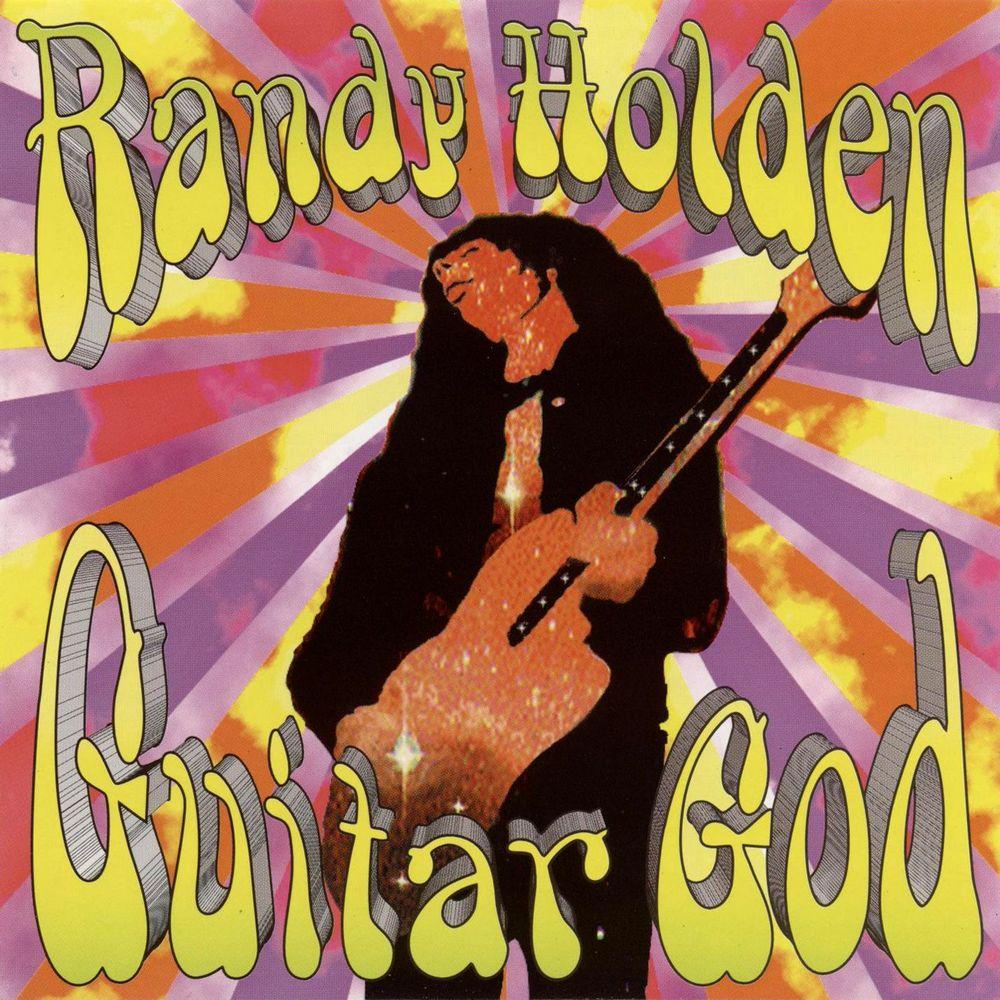
Then you released ‘Raptor’ and another album with Jaclyn Guthrie called ‘Touch of Heaven’.
‘Raptor’ came about as a result of my old friend Michael Stuart drums for me in the Sons of Adam. Michael was always a very strong drummer, and I thought he did a really awesome creative job on ‘Raptor’. He was great to play with, he had endless energy, and it’s a rare opportunity to play with someone who can go into overdrive for as long as you like. That was a blast. Eliot did what to me was some of the best bass playing ever, creating lines that fit the music better than I can imagine anyone could have. It’s quite an interesting album, I was happy doing it and how it turned out. The only thing I regretted was, it was becoming so much fun to get together a week out of all the money and play, and I kept writing new material, so every time we got together we always did something new, it was difficult to have to end what we were doing. It held more promise for becoming a truly great band line up. I would have liked to have taken that a lot further, and live, but life has its own demands. I thought maybe the best way to do it was run away and be the circus, and forget responsibilities … I’m still working on that idea.
Working with Jaclyn Guthrie was a wholly unexpected surprise, and a rare treat. Meeting Jaclyn was an out of the blue incident. I actually met Jaclyn’s mom first, and we just hit it off had a really enjoyable conversation, in my art gallery, and on Robin learning I was a musician, with a bit of a rascally history, she told me about her daughter Jaclyn, that she was an aspiring singer, and was trained in opera for ten years. Some time thereafter Robin brought Jaclyn to our other gallery to meet me, and she was every inch gorgeous as her mom said. I wasn’t sure why I should know such things, other than, Jaclyn would be an incredible visual attraction as a singer performer. Then they wanted me to see a brief video of Jaclyn singing Opera on the internet. She was phenomenal, I hadn’t expected that. As we talked, she wanted to sing, and didn’t care what kind of music it was. I said I’d send her a piece I wrote, titled ‘Spanish Nights,’ and if it sounded like anything she might be interested in singing to, we’d turn on the studio and see what happened. As it turned out Jaclyn loved the song and couldn’t wait to record. Once we got into the studio it was like magic. I never had an experience quite like that. I really enjoyed singing with her. I had songs I’d written I never quite knew what to do with, and here comes Jaclyn, perfectly made for those songs. Once each month for the six following months we recorded, and it was a blast. We had close to three albums of music recorded, and put the ‘Touch of Heaven’ together as the first, of what I hoped would be many. It’s very different from anything I’ve ever done before, and I play Nylon string guitar for the most part. It would have what I believed would be a completely different audience than I’ve had before, but then I’ve done quite a diverse array of music, so this was just one more direction. Everyone who heard the album or has a copy loves it, but in terms of commercial success, it didn’t get the interest of any current business label, but nonetheless it’s a super nice album.
“Painting is a whole other time zone of reality”
You are also a painter.
I seem to paint when I have emotional breakdowns, and when I’m well enough to trust myself in the presence of humanity again. I seem to somehow drift away from painting, for considerable periods of time, until the next major breakdown, and I find the brush or knife and go through a flurry of painting activity. Painting is a whole other time zone of reality. You might have noticed somewhere along the line, many people would like to paint, but they all say they will do it when they retire, and nothing odd about that because it’s damn difficult to make a living with a paint brush. Nonetheless I love painting, but time has to standstill somehow for me to do it in earnest. It truly is a whole other time space, just by its nature. I suppose if I would have sold enough works I would never stop painting. I’ve won top awards at several art exhibitions, but then I drift away, until the next time it swoops in and carries me away. I’ve been wanting to paint for the last couple of years, but I haven’t found the time and space to step through and be captured into its gravity, yet!
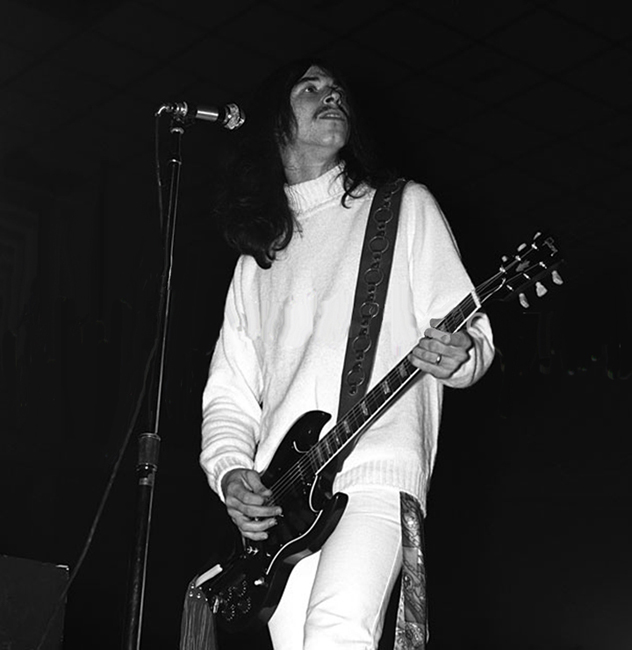
Any future plans?
Which future? I have so many things I want to do it will take more than a few lifetimes to do them, and I’m still working on that plan, I dreamed of an antigravity machine, and it was so amazing, the only reason no one thought of how to make it was it was so simple it was like the nose on our face, we can’t see it, but it’s there, and the concept is the opposite of what we know things to be. I’m working on that one, but I have difficulty remembering what I see in my dreams, so I’m working on thinking simplistically, but it often gets pretty complicated. No surprise there. I have more songs than I have time to record. I’m trying to record a new album, and several more along with it. We’ll see what happens with that, for a start.
Thank you for taking your time. Last word is yours.
Have a few great days!
Klemen Breznikar
Randy Holden Official Website / Facebook
Loud and Proud: The Best Heavy Psychedelic Rock Albums Ever! | ‘Population II’ by Randy Holden




Thanks for this way cool interview
"The Fender IV – Sons Of Adam Story" here:
http://rockprosopography102.blogspot.com/2010/09/fender-iv-sons-of-adam.html
"The Other Half Story" here:
http://rockprosopography102.blogspot.com/2010/09/other-half-story.html
"Blue Cheer Family Tree – Performance List" here:
http://thesanfranciscosound.blogspot.com/2010/03/blue-cheer-performance-list-work-in.html
Interesting guy and a good musician. One of the best interviews in the site.